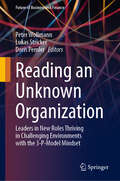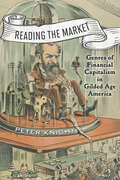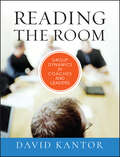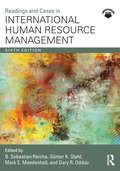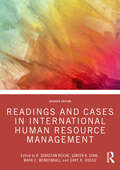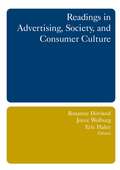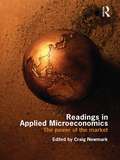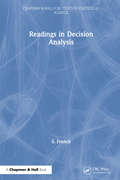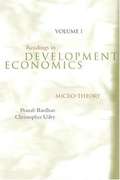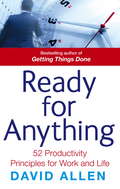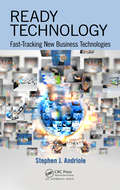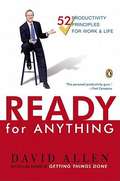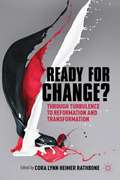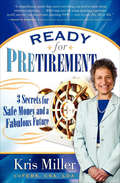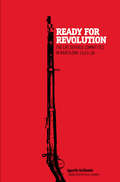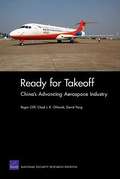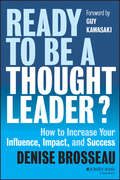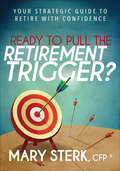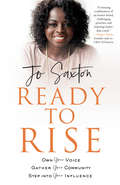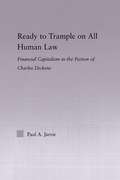- Table View
- List View
Reading an Unknown Organization: Leaders in New Roles Thriving in Challenging Environments with the 3-P-Model Mindset (Future of Business and Finance)
by Peter Wollmann Lukas Stricker Doris PemlerThis book focuses on "Organizational Intelligence" and its connection to the Three-Pillar Model, a framework developed by a global community of over 60 professionals from various sectors and published by Springer Nature. The model centers on three vital pillars for navigating the volatile, uncertain, complex, and ambiguous (VUCA) world of organizational design and leadership: Sustainable Purpose, Travelling Organization, and Connectivity.At its core, the book features interviews with executive leaders, including those in the C-Suite, who have recently assumed new roles in new organizations or have done so in their careers. The interviews are diverse and anonymized to encourage candid responses. The book explores how these leaders quickly gain a comprehensive understanding of their organizations, with a focus on coping with change, transformation, sustainability, and UN SDG coverage.Offering real case study-based guidance, the book does not seek to provide a one-size-fits-all methodology but instead encourages readers to tailor its insights to their unique circumstances. It is a valuable resource for mentoring and coaching purposes.
Reading the Balance of Payments
by Louis T. Wells Jr.Describes the construction of the balance of payments and defines frequently used measures taken from the balance of payments.
Reading the Market: Genres of Financial Capitalism in Gilded Age America (New Studies in American Intellectual and Cultural History)
by Peter KnightAmerica’s fascination with the stock market dates back to the Gilded Age.Winner of the BAAS Book Prize of the British Association of American StudiesAmericans pay famously close attention to "the market," obsessively watching trends, patterns, and swings and looking for clues in every fluctuation. In Reading the Market, Peter Knight explores the Gilded Age origins and development of this peculiar interest. He tracks the historic shift in market operations from local to national while examining how present-day ideas about the nature of markets are tied to past genres of financial representation.Drawing on the late nineteenth-century explosion of art, literature, and media, which sought to dramatize the workings of the stock market for a wide audience, Knight shows how ordinary Americans became both emotionally and financially invested in the market. He analyzes popular investment manuals, brokers’ newsletters, newspaper columns, magazine articles, illustrations, and cartoons. He also introduces readers to fiction featuring financial tricksters, which was characterized by themes of personal trust and insider information. The book reveals how the popular culture of the period shaped the very idea of the market as a self-regulating mechanism by making the impersonal abstractions of high finance personal and concrete.From the rise of ticker-tape technology to the development of conspiracy theories, Reading the Market argues that commentary on the Stock Exchange between 1870 and 1915 changed how Americans understood finance—and explains what our pervasive interest in Wall Street says about us now.
Reading the Room
by David KantorPraise for Reading the Room "If you believe, as I do, that tackling our toughest problems in organizations and societies will require significant advances in the human domain of how we think and interact, then you will find this book a wonderful resource for a healthier future. "-Peter Senge, senior lecturer, leadership and sustainability, MIT Sloan School of Management; and founding chair, Society for Organizational Learning (SoL) "A must-read for anyone truly interested in gaining access to and managing their own actions/behavior as well as all those we work with, live with, and interact with. It will shift the way you, others, and the world occur for you. "-Michael C. Jensen, Jesse Isidor Straus Professor of Business Administration, emeritus, Harvard Business School "David Kantor is one of the very few master innovators and theorists in organizational leadership. In this combined story and practice guide, Kantor helps leaders see the hidden dynamics of the groups they lead, and the personal and social factors that shape their relationships with those groups. " -Art Kleiner, editor in chief, strategy+business "Kantor addresses the fundamental issue that leaders are surprisingly inept in conversation and in managing groups. Leaders and managers at all levels should be learning these concepts in order to improve their own ability to analyze what is going on and react appropriately. "-Edgar H. Schein, professor emeritus, MIT Sloan School of Management; and author, Helping: How to Offer, Give, and Receive Help "An exceptional book in the true sense of the word. It stands alone in its grasp of what it takes to succeed as a leader. It's not simply about mastering the five forces, milking cash cows, accelerating experience curves, or even spurring disruptive innovation. It's about reading the room. Leaders who gain mastery of what David Kantor has to teach in this book will achieve true success, not just as leaders, but as people. " -Diana M. Smith, chief executive partner, New Profit Inc. ; and author, The Elephant in the Room: How Relationships Make or Break the Success of Leaders and Organizations "There are only a few wise masters in the world when it comes to any real understanding of leader-ship, and even fewer who share their secrets. David Kantor is one of them, and in Reading the Room we have brilliantly laid out before us both a unique lens and a highly practical method that will change for good the way you lead, and more, the way you think. Not to be missed!" -William Isaacs, author, Dialogue and the Art of Thinking Together; and senior lecturer, MIT Sloan School of Management
Readings and Cases in International Human Resource Management
by B. Sebastian Reiche, Günter K. Stahl, Mark E. Mendenhall and Gary R. OddouThe new edition of Readings and Cases in International Human Resource Management examines the interactions between people, cultures, and human resource systems in a wide variety of regions throughout the world. Taking account of recent developments in the international human resources management (IHRM) field, the sixth edition will enable students to meet the international challenges they will face in the workforce, and sensitize them to the complexity of human resource issues in the era of globalization. Features include: New readings and case studies that account for recent changes in the field, positioned alongside "tried and true" material. An increased focus on cross-cultural diversity and tools to bridge "social distance" between team members. Supplemental material and teaching notes, available for download, to enhance instructors’ abilities to use the readings and cases with their students. With well-known contributors and field experts, this is the ideal accompaniment for any class in international human resource management, organizational studies, or international business.
Readings and Cases in International Human Resource Management
by B. Sebastian Reiche, Günter K. Stahl, Mark E. Mendenhall, and Gary R. OddouThis new edition of Readings and Cases in International Human Resource Management is a classic edited textbook, taking account of recent developments in the international human resources management (IHRM) field, such as the pandemic, the role of diversity, equity, and inclusion, as well as climate change. It includes a range of key readings that are essential for understanding the field and contextualizes each one with a selection of real-life case studies that demonstrate their meaning and impact in practice. The book aims to sensitize the reader to the complex human resource issues that exist in the global business environment. To that end, it strives to publish “tried and true” readings and cases that provide stimulating and intellectually challenging material and are written in ways that engage both the student and the instructor. Key features include: New readings and case studies that account for recent changes in the field, positioned alongside “tried and true” material Integration of contemporary themes such as remote working, digitization, sustainability, and social issues throughout the book An expanded introductory chapter, new discussion questions, and consistent pedagogy throughout Supplemental tutor support material, additional cases, and teaching notes to enhance instructors’ abilities to use the readings and cases with their students Bringing together well-known contributors and field experts into one encompassing text, this textbook is ideal for any class in international human resource management, international organizational behaviour, or international business. This seventh edition is thoroughly updated to enable students to understand the complexity of human resource issues in the post-pandemic era of global, remote, and technology-mediated working.
Readings in Advertising, Society, and Consumer Culture
by Roxanne Hovland Joyce M. Wolburg Eric E. HaleyThis collection of classic and contemporary articles provides context for the study of advertising by exploring the historical, economic, and ideological factors that spawned the development of a consumer culture. It begins with articles that take an institutional and historical perspective to provide background for approaching the social and ethical concerns that evolve around advertising. Subsequent sections then address the legal and economic consequences of life in a material culture; the regulation of advertising in a culture that weighs free speech against the needs of society; and the ethics of promoting materialism to consumers. The concluding section includes links to a variety of resources such as trade association codes of ethics, standards and guidelines for particular types of advertising, and information about self-regulatory organizations.
Readings in Applied Microeconomics: The Power of the Market
by Craig NewmarkA central concern of economics is how society allocates its resources. Modern economies rely on two institutions to allocate: markets and governments. But how much of the allocating should be performed by markets and how much by governments? This collection of readings will help students appreciate the power of the market. It supplements theoretical explanations of how markets work with concrete examples, addresses questions about whether markets actually work well and offers evidence that supposed "market failures" are not as serious as claimed. Featuring readings from Hayek, William Baumol, Harold Demsetz, Daniel Fischel and Edward Lazear, Benjamin Klein and Keith B. Leffler, Stanley J. Liebowitz and Stephen E. Margolis, and John R. Lott, Jr., this book covers key topics such as: • Why markets are efficient allocators • How markets foster economic growth • Property rights • How markets choose standards • Asymmetric Information • Whether firms abuse their power • Non-excludable goods • Monopolies The selections should be comprehended by undergraduate students who have had an introductory course in economics. This reader can also be used as a supplement for courses in intermediate microeconomics, industrial organization, business and government, law and economics, and public policy.
Readings in Decision Analysis
by S. FrenchProvides an introduction to decision analysis. This book is based upon a number of papers and articles taken from the Operational Research Society's journal and other publications. However, the book is not simply a 'collection of reprints': Professor French has provided extensive notes and commentary to weave the extracts into a coherent whole. Although techniques are presented, the main thrust is to convey the purpose of decision analysis and the interpretation that should be placed upon its output: vital topics, but ones seldom discussed in introductory texts. The writing is aimed at the non-technical reader.
Readings in Development Microeconomics, Volume 1: Micro-Theory
by Pranab Bardhan Christopher UdryThese two volumes of readings attempt to bring some degree of structure to a relatively diffuse field. Because of the sheer volume of high-quality work in development economics research, they are intended as a sampling of work at the frontier of the field, rather than as a comprehensive overview. Volume 1: Micro-Theory focuses on theoretical work. Topics covered include sharecropping as a principle-agent problem, fragmented duopolies, credit market imperfections, poverty traps, peer monitoring in credit cooperatives, coordination failures, human capital accumulation as an engine of growth, and environmental issues in development.
Readings on Modern Organizations
by Amitai Etzioni28 contributors examine the problems of organizational rationality.
Ready For Anything: 52 productivity principles for work and life
by David AllenDavid Allen, 'the guru of personal productivity' (Fast Company Magazine) and author of the business bestseller GETTING THINGS DONE, inspires us to work better, not harder, in his new book, READY FOR ANYTHING. Offering over 50 productivity principles to help you clear your head and focus, READY FOR ANYTHING enables you to identify what drives you, what holds you back and how to be ready for anything. With motivational insights and inspirational quotes, READY FOR ANYTHING shows readers how to make things happen with less effort, stress and inefficiency, and lots more energy, creativity and clarity. This is the perfect inspirational and motivational book for anyone wanting to work and live at their very best.
Ready Technology: Fast-Tracking New Business Technologies
by Stephen J. AndrioleCompanies understand that their ability to compete is tied directly to their ability to leverage the very latest technology advances. Fortunately, deploying new technology has never been easier, primarily due to early maturity and cloud delivery. One approach that is helping companies rapidly pilot and affordably deploy new technologies is ready te
Ready for Anything
by David AllenIn his bestselling first book, Getting Things Done, veteran coach and management consultant David Allen presented his breakthrough methods to increase efficiency. Now "the personal productivity guru" (Fast Company) shows readers how to increase their ability to work better, not harder--every day. Based on Allen's highly popular e-newsletter, Ready for Anything offers readers 52 ways to immediately clear your head for creativity, focus your attention, create structures that work, and take action to get things moving. With wit, inspiration, and know-how, Allen shows readers how to make things happen--with less effort and stress, and lots more energy, creativity, and effectiveness. Ready for Anything is the perfect book for anyone wanting to work and live at his or her very best.
Ready for Anything: 52 Productivity Principles for Getting Things Done
by David AllenIn his bestselling first book, Getting Things Done, veteran coach and management consultant David Allen presented his breakthrough methods to increase efficiency.<P><P> Now "the personal productivity guru" (Fast Company) shows readers how to increase their ability to work better, not harder--every day. Based on Allen's highly popular e-newsletter, Ready for Anything offers readers 52 ways to immediately clear your head for creativity, focus your attention, create structures that work, and take action to get things moving.With wit, inspiration, and know-how, Allen shows readers how to make things happen--with less effort and stress, and lots more energy, creativity, and effectiveness. Ready for Anything is the perfect book for anyone wanting to work and live at his or her very best.
Ready for Change?
by Cora Lynn Heimer RathboneAimed at managers and executives wanting insight into how to better drive change at the micro and macro level, Ready for Change? provides guidance in understanding the factors within different business disciplines that enable and disable lasting change through examples of good practice and 'not so good' practice within real organisations.
Ready for Pretirement: 3 Secrets for Safe Money and a Fabulous Future
by Kris MillerA little planning goes a long way—prepare for a more secure financial future with this practical, proactive guide that &“will help you sleep at night&” (Sam Horn, author of Pop!). Retirement planning can be scary, confusing, and overwhelming—especially if you wait until you&’re faced with a family medical emergency. It is during these unexpected situations that people often make foolish decisions because of the stress and pressure to make a quick choice. Stop procrastinating and get started now with the tools included in this guide. Older people can face pressing financial planning issues related to age and health—that&’s why retirement planning isn&’t just for seniors. Author Kris Miller taps into her vast estate planning experience and explains why you should get started now—even if you&’re only in your twenties or thirties. Learn how to create a Living Will and a Living Trust; make sure your family is cared for; build wealth; protect your assets from sky-high medical expenses; and retire happy. Ready For Pretirement provides an easy-to-understand overview of the financial decisions that need to be made. From writing a will to creating a trust, from the proper way to hold property to selecting low-risk investments, this book provides necessary guidance—so when you&’re ready to plunge into your golden years, you can do it with peace of mind.
Ready for Revolution
by Paul Sharkey Agustín GuillamónSeeing the writing on the wall, one of Spain's largest unions began secretly arming workers throughout the country. The anarcho-syndicalist union evolved from overseeing workers' defense to organizing armed resistance to the Fascist coup. From there, it administered entire militias and finally coordinated industrial self-management and food distribution, leading a revolution within the Spanish Civil War. A fascinating new history and a lively narrative of ordinary men and women making history.Agustín Guillamón is an independent historian and the author of The Friends of Durruti Group, 1937-39 and The Committees Revolution.
Ready for Revolution
by Paul Sharkey Agustín GuillamónSeeing the writing on the wall, one of Spain's largest unions began secretly arming workers throughout the country. The anarcho-syndicalist union evolved from overseeing workers' defense to organizing armed resistance to the Fascist coup. From there, it administered entire militias and finally coordinated industrial self-management and food distribution, leading a revolution within the Spanish Civil War. A fascinating new history and a lively narrative of ordinary men and women making history.Agustín Guillamón is an independent historian and the author of The Friends of Durruti Group, 1937-39 and The Committees Revolution.
Ready for Takeoff: China's Advancing Aerospace Industry
by Roger Cliff David Yang Chad J. OhlandtAn assessment of China's aerospace manufacturing capabilities and how China's participation in commercial markets and supply chains contributes to their improvement. It examines China's aviation and space manufacturing capabilities, government efforts to encourage foreign participation, transfers of foreign technology to China, the extent to which U.S. and foreign aerospace firms depend on supplies from China, and their implications for U.S. security interests.
Ready to Be a Thought Leader
by Guy Kawasaki Denise BrosseauThe how-to guide to becoming a go-to expertWithin their fields, thought leaders are sources of inspiration and innovation. They have the gift of harnessing their expertise and their networks to make their innovative thoughts real and replicable, sparking sustainable change and even creating movements around their ideas. In Ready to Be a Thought Leader?, renowned executive talent agent Denise Brosseau shows readers how to develop and use that gift as she maps the path from successful executive, professional, or civic leader to respected thought leader.With the author's proven seven-step process--and starting from wherever they are in their careers--readers can set a course for maximum impact in their field. These guidelines, along with stories, tips, and success secrets from those who have successfully made the transition to high-profile thought leader, allow readers to create a long-term plan and start putting it into action today, even if they only have 15 minutes to spare.Offers a step-by-step process for becoming a recognized thought leader in your fieldIncludes real-world examples from such high-profile thought leaders as Robin Chase, founder and former CEO of Zipcar; Chip Conley, author of PEAK and former CEO of JDV Hospitality; and moreWritten by Denise Brosseau, founder of Thought Leadership Lab, an executive talent agency that helps executives become thought leaders, who has worked with start-up CEOs and leaders from such firms as Apple, Genentech, Symantec, Morgan Stanley, Medtronic, KPMG, DLA Piper, and moreReady to Be a Thought Leader? offers essential reading for anyone ready to expand their influence, increase their professional success, have an impact far beyond a single organization and industry, and ultimately leave a legacy that matters.
Ready to Pull the Retirement Trigger?: Your Strategic Guide to Retire With Confidence
by Mary SterkA professional wealth manager guides you through the decision of when retirement is right for you, and how to make the leap with confidence. Many people today want to retire early. Perhaps you want to slow down and enjoy your life, spouse, and grandkids. But there are many factors to consider when deciding whether to move into the retirement phase of your life. What if your savings run out? When should you start taking your Social Security? What if there&’s a major health issue? And perhaps most important of all—where can you turn for answers you can trust? There are no do-overs in retirement. You need a path and a strategy. Mary Stark, wealth manager and owner of Stark Financial Services provides the essential tools and knowledge you need to pinpoint when work becomes optional for you, and create a plan that lets you retire with confidence.
Ready to Rise: Own Your Voice, Gather Your Community, Step into Your Influence
by Jo SaxtonA powerful call to step into your full potential that biblically affirms the need for women to rise up and work together to make a better world. "Jo is one of my most trusted voices in Christian leadership. . . . She leads auditoriums full of people, and she leads me one-on-one."—Jen Hatmaker Have you ever questioned the roles you find yourself in, wondering if you were made for more but unsure of the rocky path before you? Have you had a clear vision for your life, but along the way, insecurity and fear weighted your dreams and silenced the voice within you? You&’re not alone. Many amazing women like you have experienced the same struggles. Whether you&’re moving into leadership, discovering your calling, fighting for change, or doing all three, leadership coach and speaker Jo Saxton affirms that God designed women for influence and impact. But are you living up to your full potential? Ready to Rise tackles the real-life issues—from harassment and sexism to self-doubt and loneliness—that can discourage and derail women from leading in the areas God has called them to. With insights from her own journey and powerful biblical examples, Jo offers practical advice to empower and equip women to transform their communities. If you&’ve ever longed to uncover your true potential, own your voice, and boldly advance God&’s goodness in the world, now is the time to start. Get ready to rise!
Ready to Trample on All Human Law: Finance Capitalism in the Fiction of Charles Dickens (Studies in Major Literary Authors)
by Paul A. JarvieThis book explores the relationship between Dickens’s novels and the financial system. Elements of Dickens’s work form a critique of financial capitalism. This critique is rooted in the difference between use-value and exchange-value, and in the difference between productive circulations and mere accumulation. In a money-based society, exchange-value and accumulation dominate to the point where they infect even the most important and sacred relationships between parts of society and individuals. This study explores Dickens’s critique from two very different points of view. The first is philosophical, from Aristotle’s distinction between "chrematistic" accumulation and "economic" use on money through Marx’s focus on the teleology of capitalism as death. The second view is that of nineteenth-century financial journalism, of "City" writers like David Morier Evans and M. L. Meason,, who, while functioning as "cheerleaders" for financial capitalism, also reflected some of the very real "dis-ease" associated with capital formation and accumulation. The core concepts of this critique are constant in the novels, but the critique broadens and becomes more pessimistic over time. The ill effects of living in a money-based society are presented more as the consequences of individual evil in earlier novels, while in the later books they are depicted as systemic and pervasive. Texts discussed include Nicholas Nickleby, A Christmas Carol, Little Dorrit and Our Mutual Friend.
